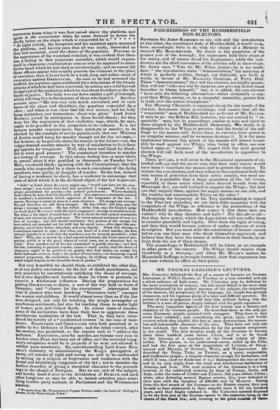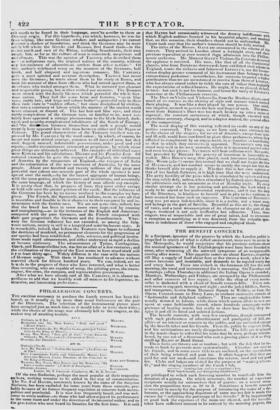MR. THOMAS CARLISLE'S LECTURES.
Ma. CARLISLE delivered the first of a course of lectures on German Literature, at Willis's Rooms, on Tuesday, to a very crowded and yet a select audience of both sexes. Mr. CARLISLE may be deficient in the mere mechanism of oratory; but this minor defect is far more than counterbalanced by his perfect mastery of his subject, the originality of his manlier, the perspicuity of his language, his simple but genuine eloquence, and his vigorous grasp of a large and difficult question. No person of taste or judgment could hear him without feeling that the lecturer is a man of genius, deeply imbued with his great argument. The most important Winch of the first lecture was a history and character of the German people. He desciibed them us the only ge- nuine European people, unmixed with strangers. They have in fact never been subdued ; and, considering the great, open, and fertile country which they inhabit, this fact at once demonstrates the mascu- line and indomitable character of the race. They have not only not been subdued, but been themselves by far the greatest conquerors in the world. The first mention made of the Germans in history dates three hundred years before Christ, and is to be found in the itinerary of a merchant of the Greek colony of Mar- seilles. This person, in his professional career, sailed up the Elbe, and had the first peep at the progenitors of LUTHER, of SHAK- SPEARE and MILTON, Of NEWTON, WATT, and WASHINGTON. He described the Duits, Tuits, or Teutoni, as a quiet, respectable, and inoffensive people ; a singular character enough for barbarians, and which if true, (and we doubt not it is,) distinguishes the race at once and in its very origin from the cruel and mischievous barbarians of America and Asia. The next mention of the Germans is at a long interval, in the celebrated invasion by them of France, Spain, and Italy, under the name of Cimbri and Teutoni, 102 years before Christ ; when, after defeating several Roman armies, they were defeated in their turn with the slaughter of 200,000 men by MARIUS. Dating from this first attack of tbe Germans on the Roman empire, they may be said to have persevered in their assaults upon it for six hundred years, until they finally subdued it. Mr. CARLISLE seemed disposed to fix the first seat of the German nation in the countries lying on the shores of the Black Sea; and, trusting to the great number of Sans- mit words to be found in their language, eveirto ascribe to them an Oriental origin. For this hypothesis, (on which, however, he was far fruit relying, like some Gentili,' scholars and antiquaries,) we cannot di-rover a shadow of foundation, and think the Germans may be more safe ly left where the Greeks and Romaius. first found them—in the re ion north and cast of the Rhine, including Scandinavia, their own weigh. but, as far as the culture of man is concerned, auspicious soil awl climate. This was the opinion of 'FACITUS, who described them as •• se indigenous race, the original natives of the country, without spy intermixture of adventitious settlers from other tuitions." Of tbi- author's celebrated essay on the manners of the Germans, half trials and half eloquent and itmenious romance, Mr. CARLISLE peer. a II10,4 spirited and uccurate description. TACITL'S bad never seen the Germans; he wrote almut them in his study at Rome, and took his account of them from officers who had served slimiest them, or meechants who traded amongst the in. What he narrated was pleateant and respectable gossip, but neither critical nor aceurate. The Rummer were struck with the family likeness which pervaded the while Ger- mato ration. They had the seine form and features, e stein blue eyes, ruddy hair, and large and robust hodies"—powerful only in their then rude state in "sudden efforte," but since disciplined by civilize- lion into a constancy of labour which the masters of the ancient world never attained, or dreamt of. The fair hair and blue eyes, and clear ruddy complexions of the German nice, so familiar to us, t cer- tainly hive appeared a strange phenomenon to the black-haired, dark. eyed.. and swarthy-complexioned inhnbitents of the South of Europe ; mil 'the distilection between themselves and such u people would scarcely 'neve appeared less wide Oran between either and the Negro or Gillette. The grand characteristic ef the Teutonic intelleet was ex. pressed by Mr. CARLISLE by the word valour; by which, of course, he memo not mere animal courage, common to cell races of men, but that cool, dogged, onwand, indomitable perseverance, under good and evil repots—under circumstances untoward or propitious, by which alone great thiugs are ultimately achieved. His examples of individual cases were KeeLen and his calculations, MILTON mid his Paradise Lost. Of eatitend examples Ile gave the coequest of England, the settlement of America by the conquerors of Fie:laud—the conquest of India and the colemization of the new continent of Australia, by the same people. About one hundred and twenty millions of this great .and powerful race (about one-seventh part of the whole species) is now spread over the earth,—by fur the hugest aggregate ot human beings, with the same genius, similar manners and institutions, and essentially the same language, of which the history of man Wools any example. It is pretty clear that, in progiess of time, they must either occupy or hold rule over the greater portion of the earth. But the influence of the Germans has been by no means confined to the examples tte have given. The French, the Spaniurds, and Italians, seem to owe all that is masculine and durable in their character to their conquest by and in-
termixture with the Gothic race. We are not quite sure, indeed, but that the breed has been in some cases even improved by crossing and transplanting,—as in the instances of the English and Americans compared with the pure Germans, and the French compared with their part progenitors the Germans and the Scandinavians. Wher- ever the German influence has not extended, as among the Selig. tonic nations, society is still in a languid and semi-barbarous state. It is remarkable, indeed, that before the Teutonic race began to influence the destinies of mankind, no pennunent elements for the progression of our species had been established. Arts, sciences, and political institu- tions made rapid advancement, and either underwent as rapid a decline or became stationary. The advancement of Tyrian, Carthaginian, Greek, arid Roman civilization, was but an affair of a few centuries; and the civilization of the people of the East seems to have stood stock still r at least thirty ages. Widely different is the rase with the nations ef German origin. With them it has continued to advance without material check for fifteen hundred years. We can, indeed, set no be u ids to the progress of those who have invented, and what is better than inventing, who are capable of using, the printing-press, the steam. engine, fire-terms, the compass, and representative government.
After what we have already said of Mr. CARLISLE, it is almost su- perfluous to add that we heartily wish all success to his ingenious, in- structive, and interesting preleetions.



























 Previous page
Previous page